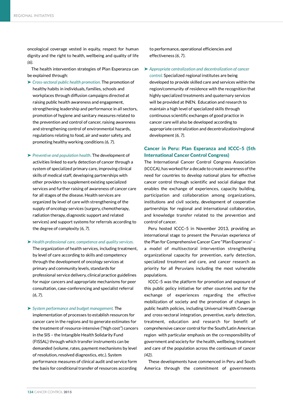
oncological coverage vested in equity, respect for human
dignity and the right to health, wellbeing and quality of life
(6).
The health intervention strategies of Plan Esperanza can
be explained through:
‰ Cross-sectoral public health promotion. The promotion of
healthy habits in individuals, families, schools and
workplaces through diffusion campaigns directed at
raising public health awareness and engagement,
strengthening leadership and performance in all sectors,
promotion of hygiene and sanitary measures related to
the prevention and control of cancer, raising awareness
and strengthening control of environmental hazards,
regulations relating to food, air and water safety, and
promoting healthy working conditions (6, 7).
‰ Preventive and population health. The development of
activities linked to early detection of cancer through a
system of specialized primary care, improving clinical
skills of medical staff, developing partnerships with
other providers to supplement existing specialized
services and further raising of awareness of cancer care
for all stages of the disease. Health services are
organized by level of care with strengthening of the
supply of oncology services (surgery, chemotherapy,
radiation therapy, diagnostic support and related
services) and support systems for referrals according to
the degree of complexity (6, 7).
‰ Health professional care, competence and quality services.
The organization of health services, including treatment,
by level of care according to skills and competency
through the development of oncology services at
primary and community levels, standards for
professional service delivery, clinical practice guidelines
for major cancers and appropriate mechanisms for peer
consultation, case-conferencing and specialist referral
(6, 7).
‰ System performance and budget management. The
implementation of processes to establish resources for
cancer care in the regions and to generate estimates for
the treatment of resource-intensive ("high cost") cancers
in the SIS - the Intangible Health Solidarity Fund
(FISSAL) through which transfer instruments can be
demanded (volume, rates, payment mechanisms by level
of resolution, resolved diagnostics, etc.). System
performance measures of clinical audit and service form
the basis for conditional transfer of resources according
to performance, operational efficiencies and
effectiveness (6, 7).
‰ Appropriate centralization and decentralization of cancer
control. Specialized regional institutes are being
developed to provide skilled care and services within the
region/community of residence with the recognition that
highly specialized treatments and quaternary services
will be provided at INEN. Education and research to
maintain a high level of specialized skills through
continuous scientific exchanges of good practice in
cancer care will also be developed according to
appropriate centralization and decentralization/regional
development (6, 7).
Cancer in Peru: Plan Esperanza and ICCC-5 (5th
International Cancer Control Congress)
The International Cancer Control Congress Association
(ICCCA), has worked for a decade to create awareness of the
need for countries to develop national plans for effective
cancer control through scientific and social dialogue that
enables the exchange of experiences, capacity building,
participation and collaboration among organizations,
institutions and civil society, development of cooperative
partnerships for regional and international collaboration,
and knowledge transfer related to the prevention and
control of cancer.
Peru hosted ICCC-5 in November 2013, providing an
international stage to present the Peruvian experience of
the Plan for Comprehensive Cancer Care "Plan Esperanza" -
a model of multisectoral intervention strengthening
organizational capacity for prevention, early detection,
specialized treatment and care, and cancer research as
priority for all Peruvians including the most vulnerable
populations.
ICCC-5 was the platform for promotion and exposure of
this public policy initiative for other countries and for the
exchange of experiences regarding the effective
mobilization of society and the promotion of changes in
public health policies, including Universal Health Coverage
and cross-sectoral integration, preventive, early detection,
treatment, education and research for benefit of
comprehensive cancer control for the South/Latin American
region with particular emphasis on the co-responsibility of
government and society for the health, wellbeing, treatment
and care of the population across the continuum of cancer
(42).
These developments have commenced in Peru and South
America through the commitment of governments
REGIONAL INITIATIVES
134 CANCER CONTROL 2015